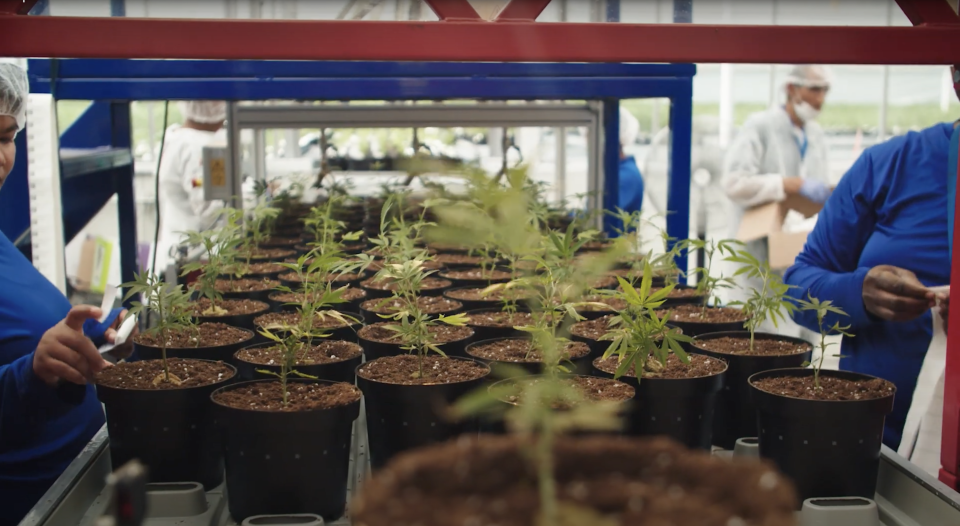Aphria to buy non-pot American brands ahead of U.S. election: analyst

Aphria (APHA.TO)(APHA) is talking up plans to buy an American household brand with no ties to cannabis. One analyst expects the company to strike a deal for a company it can pivot towards pot ahead of the presidential election in November.
Aphria was once among the most bullish Canadian licenced producers when it came to investing stateside. The Leamington, Ont.-based company turned its back on U.S. pot assets after agreeing to sell its stake in Liberty Health Sciences (LHS.CN)(LHSIF) in 2018. Its exit followed a warning from the owners of the Toronto Stock Exchange that companies directly invested in U.S. cannabis could face delisting from Canada’s two main exchanges, since the drug remains illegal under U.S. federal law.
Speaking last week at the Canaccord Genuity Global Growth Conference, chief financial officer Carl Merton spelled out how Aphria could return to the U.S. The plan calls for buying an established American consumer packaged goods firm totally unrelated to cannabis and CBD.
Merton said the business would need to be already profitable, have an established brand, and strong distribution.
“Anything that you would buy that has any level of cannabis in it, it’s going to cost you a premium. That’s just extra expense to your shareholders,” he said via video call.
“So you buy this business that doesn’t impact your primary business . . . other than positively. You slowly, slowly begin like a two year period, build out its cannabis capabilities while you are waiting for the rules to change. It’s very similar to the strategy we used in Germany with CC Pharma.”
Aphria completed its acquisition of CC Pharma in January 2019. The German pharmaceutical importer and distributor to thousands pharmacies extended Aphria’s reach in highly sought after European medical cannabis markets. The company said distribution through CC Pharma spurred strong medical cannabis growth in its latest quarter, generating more than $99 million in net revenue.
Aphria paid €18.92 million in cash to the former shareholders of CC Pharma, plus a performance-based earn-out multiple of up to €23.5 million.
“We bought an asset that wasn’t cannabis, didn’t pay a cannabis premium, and have built it now to leverage it for cannabis,” Merton said. “That’s where our focus has been, and it’s still there.”
Nikolaas Faes, an analyst with Bryan, Garnier & Co., expects Aphria will pull the trigger on a U.S. acquisition ahead of the Nov. 3 presidential election.
He said a Democratic win would set off an expansion cycle for U.S. multi-state operators that may also look to buy complementary non-cannabis businesses. It could also embolden other Canadian licenced producers who have shied away from U.S. assets due to political uncertainty. A win by the Republicans is less favourable for cannabis, he said, but it would show a clearer policy trajectory than the sector has today.
“Ideally it would happen now,” Faes told Yahoo Finance Canada of a U.S. acquisition by Aphria. He expects the company will attempt to limit risk by betting on multiple brands, rather than buying a single consumer goods company. Aphria did not respond to questions about the timing and focus of a deal.
“It would be extremely dangerous for Aphria just to go for one big acquisition,” Feas said. “What if you pick the wrong household brand? What if consumers of the brand you are repositioning don’t like your idea of using it for cannabis.”
Aphria chief executive officer Irwin Simon will oversee that pick. For three decades prior to joining the pot producer he led New York-based Hain Celestial Group (HAIN), an organic and natural food company with products in over 70 countries and US$3 billion in annual sales. Hain’s universe of brands span shampoo, healthier alternatives to potato chips, and veggie burger-maker Yves.
Faes said he doubts Aphria would consider buying a brand from Hain, given the connection to Simon.
“That would be returning Aphria back to its bad boy image, which they have cleaned up,” he said, referring to a short-seller attack that led to a company review that found Aphria overpaid for foreign assets, and company directors had undisclosed conflicts related to the deals in 2018. Simon’s predecessor Vic Neufeld and Aphria co-founder Cole Cacciavillani left their formal roles at the company shortly after and no longer sit on the board.
Simon told analysts in late June that edibles, beverages and topicals are among the next cannabis 2.0 products the company expects to launch. Faes said cosmetics or pet health acquisitions are possible if Aphria chooses to look beyond food and drinks.
The company has become known for its strong balance sheet, ending its latest quarter with $497.2 million in cash and equivalents. Merton said Aphria plans to keep a portion for its “Canadian war chest,” and deploy up to $450 million for strategic initiatives, including international expansion, with the U.S. “being the most attractive today.”
However, he notes the “mix of COVID/recession going on right now” has shrunk the number of U.S. businesses for sale that meet the company’s criteria.
“It becomes a little bit smaller pool,” he said. “It’s still there.”
Once a deal is done, he expects Aphria will have ample time to retool the business before a full-fledged U.S. cannabis market emerges.
“There's been a number of inflection points in the U.S. where people have thought it was a signal that cannabis was coming quicker than it has actually come. Bottom line, cannabis isn’t coming for the next year-and-a-half to two years. We have to get through at a minimum an election, and then there needs to be time for those legislative rules to catch up to that decision,” Merton said.
“Our belief is that you need to play the long game in the U.S.”
Jeff Lagerquist is a senior reporter at Yahoo Finance Canada. Follow him on Twitter @jefflagerquist.
Download the Yahoo Finance app, available for Apple and Android.

 Yahoo Finance
Yahoo Finance 
